

Context N°6. Context N°21 Shimon Ballas.
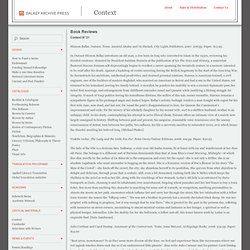
Outcast. Trans. Ammiel Alcalay and Oz Shelach. City Lights Publishers, 2007. 308 pp. In Outcast Shimon Ballas introduces an old man, a Jew born in Iraq who converted to Islam in the 1930s, reviewing his divided existence. Violette Leduc. The lady of the title is a desirous Mrs. Julio Cortázar and Carol Dunlap. “Rest areas, monotonous? Christine Brooke-Rose. The Christine Brooke-Rose Omnibus, first issued in 1986, provides a crash course in this prolific author’s too long neglected fiction, offering four of her early novels: Out (1964), Such (1966), Between (1968), and Thru (1975). Excerpt - Reality Hunger by David Shields - First Chapter. The double pressure: a review of David Shields' Reality Hunger. Reading David Shields’ new book – but in what way is it a book?
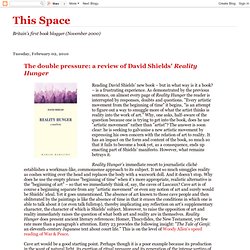
– is a frustrating experience. As demonstrated by the previous sentence, on almost every page of Reality Hunger the reader is interrupted by responses, doubts and questions. "Every artistic movement from the beginning of time" it begins, "is an attempt to figure out a way to smuggle more of what the artist thinks is reality into the work of art. " Why, one asks, half-aware of the question because one is trying to get into the book, does he use "artistic movement" rather than "artist"?
The answer is soon clear: he is seeking to galvanise a new artistic movement by expressing his own concern with the relation of art to reality. Reality Hunger's immediate resort to journalistic cliché establishes a workman-like, commonsense approach to its subject. Cave art would be a good starting point. Starting again This book contains hundreds of quotations that go unacknowledged in the body of the text. Energy of delusion What's at stake? On Reality Hunger: A Manifesto, by David Shields (Knopf) David Shields’ Reality Hunger: A Manifesto ardently tags after the American poets who have dismissed the facts of the day and their shotgun-riding media and arts.
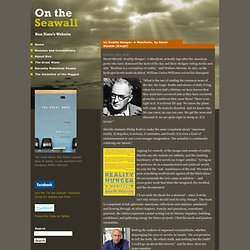
“Realism is a corruption of reality,” said Wallace Stevens. In 1951, as the hydrogen bomb made its debut, William Carlos Williams voiced his disregard: “What is the use of reading the common news of the day, the tragic deaths and abuses of daily living, when for over half a lifetime we have known that they must have occurred just as they have occurred, given the conditions that cause them?
There is no light in it. It is trivial fill-gap. Shields channels Philip Roth to make the same complaint about “American reality. Arguing for custody of the images and sounds of reality, Shields says the realists are infidels, and the clanking machinery of their novels no longer satisfies: “Living as we perforce do in a manufactured and artificial world, we year for the ‘real,’ semblances of the real.
Reality Hunger: A Manifesto by David Shields. David Griffith nonfiction Reality Hunger: A Manifesto by David Shields.
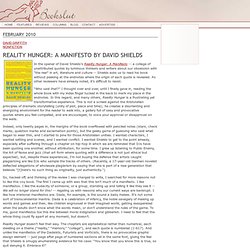
Reality Hunger, by David Shields « John’s Blog. I picked this book up because it’s mentioned in an online correspondence between Jonathan Lethem (one of my very favorite authors, although I’m finding Chronic Town tough to get through and David Gates.
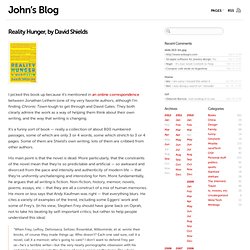
They both clearly admire the work as a way of helping them think about their own writing, and the way that writing is changing. It’s a funny sort of book — really a collection of about 800 numbered passages, some of which are only 3 or 4 words, some which stretch to 3 or 4 pages. Some of them are Shield’s own writing, lots of them are cribbed from other authors. His main point is that the novel is dead. More particularly, that the constraints of the novel mean that they’re so predictable and artificial — so awkward and divorced from the pace and intensity and authenticity of modern life — that they’re uniformly unchallenging and interesting for him. “When Frey, LeRoy, Defonseca, Seltzer, Rosenblat, Wilkomirski, et al. wrote their books, of course they made things up.